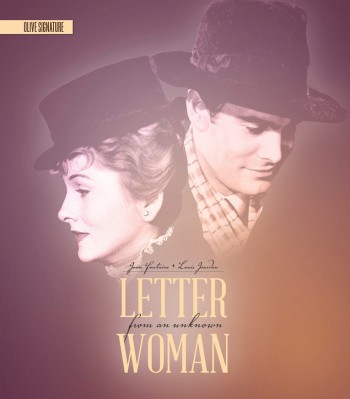If there’s anything better than revisiting a good movie, it’s learning new things about it. That’s why I appreciate deluxe editions of vintage films. Olive Films’ new 4K transfer of Max Ophüls’ Letter from an Unknown Woman would be worth owning just to savor the exquisite images, but the additional material makes it sublime. Joan Fontaine gives a superb performance as a teenage girl whose crush on a dashing concert pianist develops into an obsession. (This was five years after she played an adolescent in The Constant Nymph, but she still manages to pull it off—no small feat for a 30-year-old woman.) Louis Jourdan is every bit her equal as a self-absorbed roué who learns her full story when it is too late.

Here is an exemplar of Hollywood craftsmanship and collaboration. Producer John Houseman gathered an impressive array of talents, including Ophüls (who for some reason was billed as Opuls during his time in Hollywood), writer Howard Koch (who had worked with Houseman on such Mercury Theater radio shows as the infamous War of the Worlds), cinematographer Franz (billed as Frank) Planer, art director Alexander Golitzen, costume designer Travis Banton, and composer Daniele Amfitheatrof. There are no weak links in this chain. Most of the story takes place in Vienna, as romanticized by author Stefan Zweig, and is almost dreamlike. It’s primarily a soundstage movie, yet it has a “reality” all its own.
Producer Houseman grew impatient with how much time it took his director to plan his elaborate camera moves. Then he saw the results and realized that the finished shots ate up enough script to justify the investment of time.
Olive Films’ new Blu-ray includes an all-too-brief interview with the director’s witty son Marcel Ophüls, a great filmmaker in his own right; insightful thoughts about the look of the film from two contemporary cinematographers; a commentary by Lutz Bacher; an interview with savvy film scholar Dana Polan; a visual treatise by Tag Gallagher; and a brilliant essay by Molly Haskell about the movie and how our view of it has been shaped and reshaped over time. Learn more at www.olivefilms.com.

ClassicFlix has just released another 1940s drama, Tomorrow is Forever (1946). Not nearly as celebrated as the Ophüls romance, it’s still very good with standout performances from Claudette Colbert and Orson Welles. The cast also includes George Brent, Lucile Watson, Richard Long (in his screen debut), and eight-year-old Natalie Wood, who was discovered by director Irving Pichel. Hollywood veteran Lenore Coffee adapted Gwen Bristow’s novel about a woman whose husband dies in World War One. Kindly Brent marries her and raises her son from birth. How, then, can she bear the thought of that boy going off to war nearly twenty years later? This is the kind of fodder that is condescendingly described as a woman’s picture or a high-class soap opera. Be that as it may, it’s expertly handled and very entertaining.
Welles was 31 when he took on the role of a bearded Austrian whose body and psyche have been shattered by war; it’s a fine piece of work that is little-discussed today. (We even get to see one of Welles’ famous putty noses at the beginning of the film, before his transformation.)
I learned a great deal about this independent production from William Goetz’s International Pictures on the impressive commentary track prepared by film buff extraordinaire Ray Faiola. You may know Ray from his restorations of great movie soundtracks. Here he has created an isolated music track featuring Max Steiner’s beautiful score, which makes great use of the sentimental song “Till We Meet Again” as a recurring theme. But that’s just one of Ray’s accomplishments: he goes into fascinating detail about every aspect of this production and even incorporates segments of the half-hour radio adaptation on Screen Directors Playhouse. I didn’t think I would have the patience to watch the movie twice in a row just to hear this material but I eagerly did. I can’t pay a higher compliment to any commentary track. Learn more at www.classicflix.com








